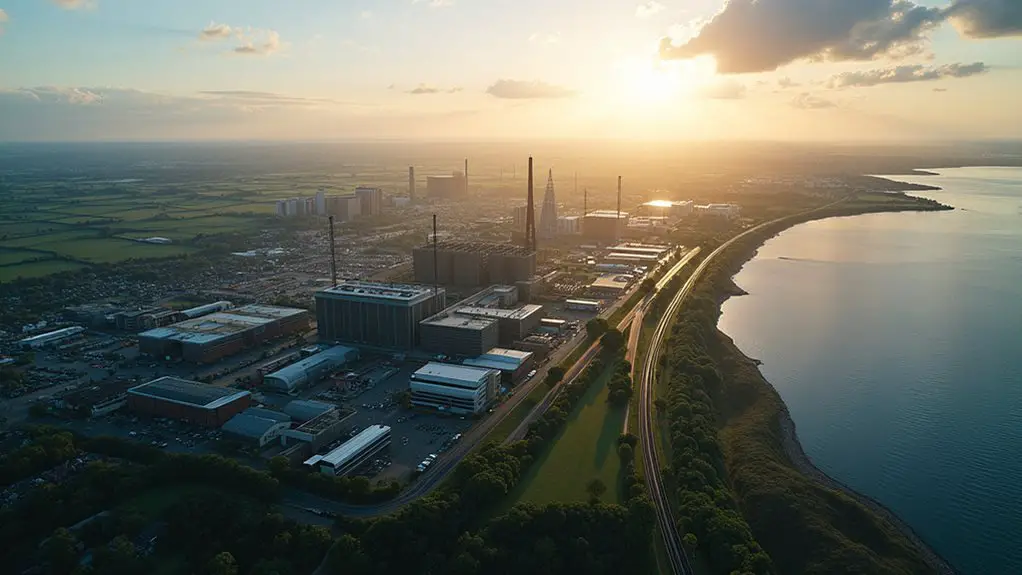Northern metropolitian mayors have formed The Great North partnership to reshape England’s economy. You’ll find their strategy focuses on clean energy, advanced manufacturing, defense, and creative industries, with targeted investments potentially adding £118 billion to the UK economy. The initiative includes development of an “Energy Coast,” a “Northern Arc” for transport connections, and a “Northern security corridor” linking cyber capabilities. Their upcoming Northern Investment Summit will showcase opportunities for global investors interested in the region’s transformation.

As northern England welcomes a bold new era of regional cooperation, The Great North partnership has emerged as a powerful alliance of metropolitan mayors determined to reshape the region’s economic future. This collaborative mission unites local leaders across the North with a shared vision of driving growth and attracting substantial investment to the area.
You’ll find The Great North partnership focusing on strategic sectors where the region already shows strength: clean energy, advanced manufacturing, defence, and creative industries. These priorities align perfectly with the UK’s broader economic ambitions while leveraging the North’s unique advantages.
The partnership has received explicit support from the UK Government, with Deputy Prime Minister Angela Rayner endorsing the initiative as an essential step in shifting power from Whitehall to local communities. This support reinforces the North’s growing influence in national economic planning.
According to research by The Great North, targeted investment could add an impressive £118 billion to the UK economy. This potential stems from the region’s 15 million residents and diverse economic base spanning green energy, digital technologies, and creative sectors.
You’ll see particular emphasis on offshore wind and green energy shift, which stand as cornerstones of the northern growth strategy. The initiative’s proposal for an energy coast development along England’s eastern shoreline aims to maximize the region’s renewable resources. Advanced manufacturing, especially electric vehicles, also represents a high-growth opportunity for the region.
The plan includes developing a “Northern Arc” to improve transport connections between major cities across the Pennines. Additionally, a proposed “Northern security corridor” would link cyber and defence capabilities throughout northern counties. Manchester and Leeds are now positioned as tech powerhouses in the region, with significant growth in AI, clean energy, and biotech sectors.
Devolution powers now grant regions like West Yorkshire, South Yorkshire, and Liverpool City Region greater control over local priorities including transport, housing, and environmental initiatives. This autonomy enables customized solutions to address regional challenges.
The partnership plans to launch international trade missions and a Northern Investment Summit to showcase the region’s potential to global investors. Through these coordinated efforts, northern leaders aim to deliver a new era of locally driven prosperity that benefits both the region and the entire UK economy.
Frequently Asked Questions
How Will Local Communities Directly Benefit From This Investment?
You’ll see direct benefits in your community through increased local prosperity and job creation across key sectors like clean energy and manufacturing.
The initiative empowers your local authorities with devolved power to make decisions that address specific regional needs.
You’ll also benefit from improved transport infrastructure, cultural investments, and economic growth.
This community-focused approach aims to distribute prosperity more evenly across Northern regions rather than concentrating it in select areas.
What Are the Specific Environmental Impact Considerations of This Plan?
The plan addresses several environmental impacts through ecosystem restoration to reduce flooding risks and improve natural capital.
You’ll see investment in an east coast energy hub focused on reducing carbon emissions.
The proposal includes sustainable transport infrastructure like new rail lines between Liverpool and Manchester to cut transport emissions and enhance air quality.
A key consideration is balancing economic growth with biodiversity protection, as tensions may arise between infrastructure development and conserving green spaces.
Which Industries Will Receive Priority Funding Within the £118bn Plan?
Within the £118bn plan, you’ll see priority funding directed to five key industries.
Clean energy will receive investment through the Energy Coast proposition.
Advanced manufacturing will gain support for manufacturing corridors across the North.
Digital and creative industries will benefit from the One Creative North partnership.
Life sciences will receive funding to drive innovation.
Transportation will see investment in critical infrastructure, including the Transpennine Route Upgrade to improve regional connectivity.
How Will Success Be Measured Beyond Simple Economic Growth Metrics?
Success will be measured through multiple dimensions beyond economic growth.
You’ll see progress tracked via employment rates across different sectors, wage growth adjusted for inflation, and reduced income inequality.
Social metrics like job quality, education access, and healthcare improvements will be monitored alongside environmental indicators including carbon reduction and green job creation.
Innovation metrics will track R&D spending, digital connectivity, and skills development programs.
These thorough measures guarantee development benefits communities in meaningful, sustainable ways.
What Failsafe Mechanisms Exist if Investment Targets Aren’t Met?
If investment targets aren’t met, you’ll find several failsafe mechanisms in place.
Regional economic strategies typically include phased reassessment points at predetermined milestones to evaluate progress.
Government budgets incorporate discretionary reserve funds to cover investment gaps, while treasury offices can implement corrective policies like tax incentives.
Private-sector partnerships often include penalty clauses tied to investment milestones, and innovative funding models such as green bonds can tap new investor pools when traditional investment lags.
- Northern Leaders Declare Bold Mission to Attract £118bn and Redefine England’s Economy - May 21, 2025
- Is Warrington the Next Investment Powerhouse? How the Northern Arc Rail Could Redefine Everything - May 21, 2025
- Crown Estate and Lendlease Forge £24 Billion Pact to Reshape UK Housing and Innovation - May 20, 2025


